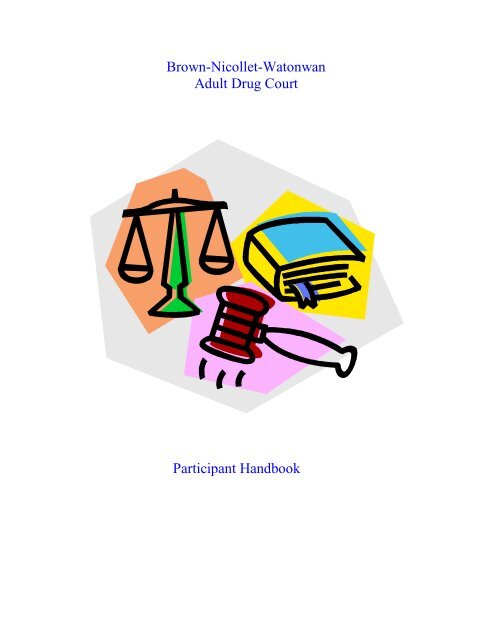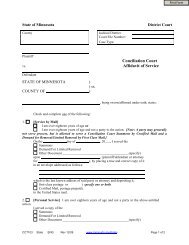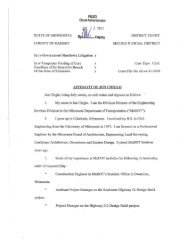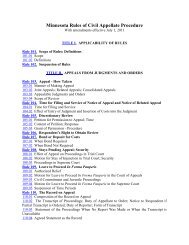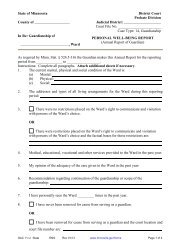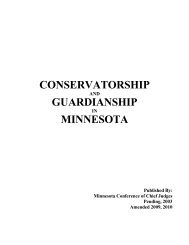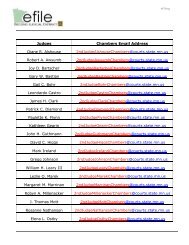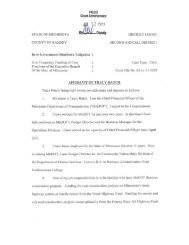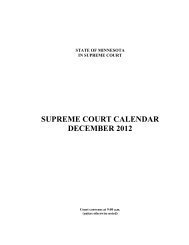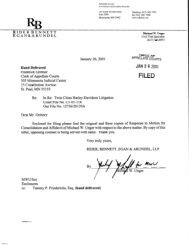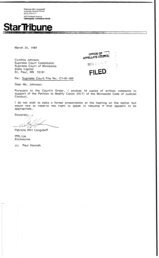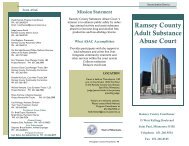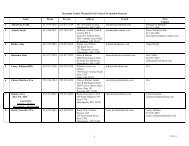Brown-Nicollet-Watonwan Adult Drug Court Participant Handbook
Brown-Nicollet-Watonwan Adult Drug Court Participant Handbook
Brown-Nicollet-Watonwan Adult Drug Court Participant Handbook
You also want an ePaper? Increase the reach of your titles
YUMPU automatically turns print PDFs into web optimized ePapers that Google loves.
<strong>Brown</strong>-<strong>Nicollet</strong>-<strong>Watonwan</strong><br />
<strong>Adult</strong> <strong>Drug</strong> <strong>Court</strong><br />
<strong>Participant</strong> <strong>Handbook</strong>
THIS BOOK BELONGS TO:<br />
NAME:<br />
_______________________________________________________<br />
CD TX Program: __________________________________________<br />
Phone:_______________________<br />
COUNSELOR: _____________________________________<br />
Phone:_______________________<br />
PROBATION AGENT: _____________________________________<br />
Phone:_______________________<br />
SPONSOR NAME:<br />
_________________________________________Phone:___________<br />
SPONSOR NAME:<br />
_________________________________________Phone:___________<br />
Do not lose this book!<br />
You must take it with you to all appointments and <strong>Court</strong> dates.<br />
Replacement handbooks will be provided at a charge of $5.
Welcome To DRUG COURT<br />
This handbook was designed to answer your questions, and to help you<br />
successfully complete the drug court program. <strong>Drug</strong> court is a fourphased<br />
intervention program for adults who are having difficulty staying<br />
clean and sober. The program treats a drug as a drug and an addict as an<br />
addict, regardless of the drug of choice. <strong>Drug</strong> <strong>Court</strong> includes intensive<br />
probation supervision, chemical dependency treatment and regular<br />
meetings between you and the <strong>Court</strong>. In <strong>Drug</strong> <strong>Court</strong> there is a close<br />
working relationship between treatment and the criminal justice systems<br />
than is typically seen in the <strong>Court</strong>s. It is a great opportunity for those<br />
who wish to change circumstances in their lives and break the cycle of<br />
drug abuse/dependency.<br />
<strong>Drug</strong> <strong>Court</strong> <strong>Drug</strong> Team<br />
The team includes the Judge, Prosecutor, Public Defender, <strong>Drug</strong> <strong>Court</strong><br />
Coordinator, Probation Agent, CD assessor, Law Enforcement,<br />
Treatment Provider, Family Services, Recovery Specialist and other<br />
professionals. Prior to each <strong>Drug</strong> <strong>Court</strong> session, the team members meet<br />
to discuss your progress with the Judge. They discuss your participation<br />
and cooperation in the treatment program, employment or other<br />
requirements you may have. We want you to succeed! The <strong>Drug</strong><br />
<strong>Court</strong> Judge and team members are committed to providing you with<br />
support and encouragement as you find your way to a clean and sober<br />
life. If you follow the program, you will see positive changes in your<br />
life as you progress through each phase. The end result is a greater<br />
likelihood that you will remain drug-free and avoid further contacts with<br />
the criminal justice system. We also encourage you to share this<br />
handbook with your family and friends for their support and<br />
encouragement.
My Phase Progression:<br />
Phase I II III IV V<br />
Date<br />
Items to be submitted for each <strong>Court</strong> appearance:<br />
1. Judge’s Journal<br />
2. <strong>Participant</strong> handbook/Support meeting attendance<br />
3. Other assignments as ordered<br />
Failure to bring required materials to court will result in a sanction.<br />
<strong>Court</strong>room Rules<br />
1. Be on time.<br />
2. Do not speak while the <strong>Court</strong> is speaking.<br />
3. Stand when addressing or being addressed by the court.<br />
4. Do not approach the bench without permission and do not lean<br />
on the bench.<br />
5. Wear appropriate <strong>Court</strong> apparel; the following are prohibited<br />
in the courtroom; flip flops, hats, sunglasses, clothes with<br />
alcohol or drug themes and tank or tube tops.<br />
6. It is forbidden to be under the influence of any intoxicating<br />
beverage and/or illicit drug.<br />
7. All weapons are banned from the courtroom.<br />
8. All cell phones or pagers must be turned off.<br />
9. No gum chewing, drinking or eating<br />
10. <strong>Drug</strong> <strong>Court</strong> hearings are open to the public. Supportive family<br />
and friends are welcome to attend.
<strong>Drug</strong> <strong>Court</strong> Program Rules<br />
1. Totally abstain from the use of all mood altering chemicals.<br />
Any prescription and over-the-counter medication must be<br />
approved by the <strong>Drug</strong> <strong>Court</strong> team or probation officer prior to<br />
use. Use of someone else’s prescription medication, synthetic<br />
drugs (i.e. K2, spice or bath salts) and non-alcoholic beverages<br />
(i.e. O’Doul’s) is prohibited.<br />
2. Do not associate with people who use or possess mood altering<br />
chemicals. This includes being present at establishments who<br />
derive their primary sales from alcohol.<br />
3. Be on time. Attend all required <strong>Drug</strong> <strong>Court</strong> hearings, treatment<br />
sessions, including individual and group counseling, support<br />
group meetings, educational sessions or other meetings as<br />
directed by the <strong>Court</strong>. Do not be late and do not leave early. If<br />
there is a possibility you will be late, contact your treatment<br />
counselor or probation officer.<br />
4. Attend <strong>Drug</strong> <strong>Court</strong> hearings. The number of times you must<br />
appear depends upon the phase of drug court you are in. Failure<br />
to appear will result in the issuance of a warrant for your arrest<br />
and detention in jail until you can appear before the court.<br />
5. <strong>Drug</strong> <strong>Court</strong> Journals. The judge will give you a drug court<br />
journal at or near the start of the program. You will be expected<br />
to write in your journal on a daily basis and turn it into the court<br />
as directed. The judge is the only person who sees your journal<br />
and information you write is not shared with the rest of the drug<br />
court team. The goal is for the judge to get to know you better<br />
and understand how you are feeling.<br />
6. Attend Support Groups as Directed. Signed verification of<br />
support group attendance (AA, NA, etc) will be reviewed at your<br />
court appearance.
7. Excused Absences. If you are unable to attend a scheduled<br />
meeting or treatment session you must contact your probation<br />
officer at least 2 hours in advance of the scheduled meeting who<br />
will determined if your absence will be excused. If it is<br />
unexcused and you fail to show up, it will result in a sanction.<br />
8. Submit to chemical testing (urine, breath, etc.) as requested by<br />
the <strong>Drug</strong> <strong>Court</strong> Team. You will be tested throughout the entire<br />
program randomly. During the early phases you will be tested<br />
more frequently.<br />
9. Current Residence. Keep the <strong>Drug</strong> <strong>Court</strong> Probation Officer and<br />
treatment provider informed of a current address, phone number,<br />
and whereabouts. You must notify the <strong>Court</strong> or probation in<br />
advance of making any changes.<br />
10. Employment/Education: You must complete 40 hours of<br />
structured activity each week. This may be accomplished<br />
actively seeking or maintaining employment, attending school/job<br />
training, performing unpaid community service, or; an alternative<br />
plan pre-approved by the <strong>Drug</strong> <strong>Court</strong> team. Any changes in<br />
employment must be reported to probation within 48 hours.<br />
11. Maintain confidentiality of other <strong>Drug</strong> <strong>Court</strong> <strong>Participant</strong>s.<br />
Treatment cannot succeed unless all participants maintain the<br />
confidentiality of other participants and of information disclosed<br />
in treatment.<br />
12. Do not make threats toward other participants or staff, or<br />
behave in a violent manner. Violent or inappropriate behavior<br />
is not tolerated and will be reported to the court. This behavior<br />
may result in a sanction or termination from the program. You<br />
may not possess any weapons while in the program.<br />
13. Pay the drug court participation fee. The court may waive a<br />
portion of the fee if you are making excellent progress in the
program. The remainder of the drug court fee must be paid prior<br />
to graduation.<br />
14. Pay all other fees, fines, restitution etc. as ordered by the <strong>Court</strong><br />
and be current with any payment plans.<br />
15. Abide by all other rules imposed by the <strong>Drug</strong> <strong>Court</strong> Team. This<br />
includes all orders and directives given by the Judge in <strong>Court</strong><br />
hearings. Other rules and requirements are outlined in the drug<br />
court participation agreement that you must sign in order to enter<br />
the program.<br />
16. Phone Contact. You are expected to answer your phone when<br />
any member of the <strong>Drug</strong> <strong>Court</strong> Team calls. If the phone call is<br />
missed, it must be returned within 30 minutes. If you are unable<br />
to do so due to work, you must provide proof.<br />
17. Knock and Chats. Throughout the program, you will be checked<br />
by law enforcement to ensure you are in compliance with court<br />
requirements. You must answer your phone when law<br />
enforcement calls and are expected to submit to any testing<br />
requested.<br />
18. Make satisfactory progress in the program as measured by<br />
activities completed in each phase.<br />
19. Releases of Information. Sign all releases of information as<br />
requested by the <strong>Drug</strong> <strong>Court</strong> Team.<br />
20. Travel. <strong>Drug</strong> <strong>Court</strong> <strong>Participant</strong>s must ask permission to leave<br />
their county of residence. These restrictions may change<br />
throughout the program.
DRUG COURT PHASES<br />
Based on your needs, an Individualized Program Plan is developed<br />
which may take from 12-24 months to complete. The plan will outline<br />
goals you must achieve prior to advancing to the next phase. There are<br />
four phases to the program. Phases are the steps identified by the<br />
drug court team you must complete in order to complete the drug court<br />
program. The length of time you will spend in the program and in<br />
each phase depends upon your individual progress. Keep in mind,<br />
if do not make adequate progress you may stay in a phase longer than<br />
other participants. If you do not follow the rules of the phase you are<br />
in, your supervision and court attendance may be increased and/or you<br />
may be moved back a Phase (if you are in an advance phase). And<br />
remember, you must be honest with the drug court team at all times.<br />
PHASE I – Stabilization/Assessment/Orientation<br />
Phase Length: Two Weeks<br />
Minimum requirements:<br />
<br />
<br />
<br />
<br />
My group counseling sessions are held on:<br />
___________________________ at: ______________________<br />
Treatment Location:_________________________________<br />
Phone: ______________________<br />
Individual counseling sessions as determined by your treatment<br />
provider.<br />
Attend weekly <strong>Drug</strong> <strong>Court</strong> Hearings. In court the judge may ask<br />
you questions about your progress and discuss any problems you<br />
may be having. If you are doing well, you may be rewarded with<br />
reduced program requirements or other incentives. If you are not<br />
doing well, the judge will discuss that with you also, and may<br />
impose a sanction, as a way to help you remember your goals in
the program. Sanctions can be anything from increasing<br />
program requirements to jail custody.<br />
Weekly journaling – You will receive a notebook from the <strong>Court</strong><br />
and will be asked to write in it on a daily basis. Your notebook<br />
will be read by the judge only, who may also make comments<br />
back to you.<br />
Minimum of 3 random alcohol or drug tests per week.<br />
Meet with probation agent at least twice a week. (<strong>Court</strong> may<br />
count as one visit)<br />
Attend 2 support meetings per week.<br />
Random checks by law enforcement or probation.<br />
Begin to make arrangements for payment of <strong>Court</strong> obligations<br />
including the drug court participation fee.<br />
Comply with any necessary referrals and keep all appointments.<br />
Complete mental health/trauma screen and follow all<br />
recommendations.<br />
Advancement Criteria to move the Phase 2:<br />
7 days negative tests or levels reducing<br />
No unexcused absences from scheduled services<br />
Treatment goals are established<br />
PHASE 2<br />
Phase Length: 4-6 Months<br />
Minimum requirements:<br />
<br />
<br />
<br />
My group counseling sessions are held on:<br />
___________________________ at: ____________________<br />
Treatment group counseling as directed by counselor.<br />
Attend weekly <strong>Drug</strong> <strong>Court</strong> hearings.
Weekly journaling to Judge.<br />
Minimum of 3 random alcohol or drug tests per week.<br />
Curfew (maximum of 10 p.m. unless approved by agent). My<br />
curfew is:_________________________<br />
Meet with probation agent at least twice a week. (<strong>Court</strong> may<br />
count as one visit)<br />
Attend 2 support meetings per week.<br />
Random checks by law enforcement or probation.<br />
Begin vocational rehabilitation/education for those seeking<br />
employment.<br />
40 hours of structured activity each week – this can include<br />
job seeking, community service, attending support group<br />
meetings, education or job skills training, etc.<br />
Establish a payment plan for court costs.<br />
Cognitive skills training – required to complete prior to<br />
graduation.<br />
Participation in monthly pro-recovery recreational and social<br />
events is expected.<br />
Advancement Criteria to move to Phase 3:<br />
Meeting all treatment goals<br />
All Phase 2 goals completed<br />
Sobriety for 60 days<br />
Current with all drug court fees<br />
No unexcused absences from scheduled services for 60 days<br />
Written phase advancement request completed by participant.<br />
Your probation agent or treatment counselor will assist you in<br />
preparing your request to move to the next phase.<br />
Steady employment or pursuing educational goals<br />
Stable housing
PHASE 3<br />
Phase Length: 3 to 6 months<br />
Minimum requirements:<br />
<br />
<br />
<br />
<br />
<br />
<br />
<br />
<br />
<br />
<br />
<br />
<br />
<br />
My group counseling sessions are held on:<br />
___________________________ at: ____________________<br />
Treatment group counseling as directed by counselor.<br />
Attend bi-weekly <strong>Drug</strong> <strong>Court</strong> hearings.<br />
Weekly journaling to Judge.<br />
Minimum of 1 random alcohol or drug tests per week.<br />
Curfew (maximum of 11 p.m. unless approved by agent). My<br />
curfew is:_________________________<br />
Meet with probation agent at least once a week.<br />
Attend 2 support meetings per week.<br />
Random checks by law enforcement or probation.<br />
40 hours of structured activity each week<br />
Continue making payments toward fines, fees etc<br />
Cognitive skills training – required to complete prior to<br />
graduation.<br />
Participation in monthly pro-recovery recreational and social<br />
events is expected.<br />
Advancement Criteria to move to Phase 4:<br />
Meeting all treatment goals<br />
Sobriety for 90 days<br />
No unexcused absences from scheduled services for 90 days<br />
All Phase 3 goals completed<br />
Current with all drug court fees<br />
Stable housing<br />
Written phase advancement request completed by participant
PHASE 4<br />
Phase Length: 4 to 6 months<br />
Minimum requirements:<br />
<br />
<br />
<br />
<br />
<br />
<br />
<br />
<br />
<br />
<br />
<br />
<br />
<br />
<br />
My group counseling sessions are held on:<br />
___________________________ at: ____________________<br />
Treatment group counseling as directed by counselor.<br />
Attend monthly <strong>Drug</strong> <strong>Court</strong> hearings.<br />
Weekly journaling to Judge.<br />
Minimum of 2 random alcohol or drug tests per month.<br />
Curfew (maximum of 12 a.m. unless approved by agent). My<br />
curfew is:_________________________<br />
Meet with probation agent at least once a month.<br />
Attend 2 support meetings per week.<br />
Random checks by law enforcement or probation.<br />
40 hours of structured activity each week<br />
Continue making payments toward fines, fees etc<br />
Cognitive skills training – required to complete prior to<br />
graduation.<br />
Participation in monthly pro-recovery recreational and social<br />
events is expected.<br />
Attend and participate in monthly alumni meetings. If you are<br />
unable to attend, you must receive prior approval from the<br />
Recovery Specialist.
GRADUATION/COMMENCEMENT<br />
Criteria for Graduation:<br />
Treatment completion (continuing care sessions)<br />
Sobriety for 90 days.<br />
Approved aftercare plan stating how you intend to maintain<br />
your sobriety after commencement.<br />
Continue educational/employment goals.<br />
<strong>Participant</strong> has obtained stable housing.<br />
Completion or satisfactory achievement of all court ordered<br />
special conditions.<br />
<strong>Drug</strong> court fees paid in full.<br />
<strong>Court</strong> fines must be current.<br />
Complete written request for graduation/commencement.<br />
On the day of your graduation/commencement, you will be expected to<br />
present a commencement message. At your commencement ceremony,<br />
the Judge will present you with a certificate of completion of the <strong>Drug</strong><br />
<strong>Court</strong> Program and will recognize your excellent accomplishments.<br />
Your family and friends are invited to attend your commencement.
Alumni Foundation<br />
The Alumni Foundation meets on a monthly basis and is facilitated by<br />
the Recovery Specialist. The Alumni Foundation focuses on sober<br />
activities along with incorporating skills and talents back into the <strong>Drug</strong><br />
<strong>Court</strong> program. Some of the Alumni activities may involve mentoring<br />
new participants, planning sober events and fundraisers and contributing<br />
to the quarterly <strong>Drug</strong> <strong>Court</strong> Newsletter.<br />
For the six months after graduation, participants may be required to<br />
attend <strong>Drug</strong> <strong>Court</strong> on an as needed basis. Random drug testing can be<br />
required by the Probation Agent or Recovery Specialist. Graduates also<br />
have the opportunity to meet with the Recovery Specialist on an as<br />
needed basis. All post graduation requirements are determined on an<br />
individual basis by the <strong>Drug</strong> <strong>Court</strong> Team.
RANDOM DRUG SCREENS<br />
Random drug screens will play a significant role in your recovery. It<br />
is your responsibility to make sure that you understand and comply<br />
with testing guidelines. If you do not feel that you fully understand,<br />
it is your responsibility to ask for clarification. Note that a missed or<br />
diluted test is viewed as a positive test by the <strong>Court</strong>.<br />
MEDICATIONS<br />
All medications will not automatically be approved. For your own<br />
protection, any over-the-counter or prescription medication must be<br />
verified and approved by the drug court staff. <strong>Participant</strong>s will be<br />
required to utilize one doctor/facility and one pharmacy for<br />
medications unless otherwise approved.<br />
TRANSPORTATION<br />
You are responsible for your own transportation to and from court<br />
hearings, meetings with your probation officer, treatment sessions<br />
and support group meetings. The <strong>Drug</strong> <strong>Court</strong> may be able to assist<br />
you on a limited basis which may include such things: scheduling a<br />
volunteer driver or public transportation (taxi, bus fare) assistance.<br />
You should talk to your probation agent to discuss your options.<br />
PROGRAM FEES<br />
There is a $600 drug court fee and your probation agent will assist you<br />
in setting up a payment plan. You will have the opportunity to earn<br />
credit against this fee if you are making excellent progress in the<br />
program. If you are terminated or choose to execute your sentence, you<br />
will be charged the entire $600 fee.<br />
Where to pay fees:<br />
Your drug court fee should be paid to <strong>Court</strong> Administration. Please tell
<strong>Court</strong> Administration staff you would like the payment applied to your<br />
drug court fees, to ensure correct accreditation.<br />
Note:<br />
You may also be required to pay a probation fee or other <strong>Court</strong> fines that<br />
are separate from the drug court participation fee.<br />
INCENTIVES<br />
Incentives are used to recognize and reward participation and progress.<br />
Upon the recommendation of the <strong>Drug</strong> <strong>Court</strong> Team, participants may be<br />
given rewards or incentives for compliant behavior. The most frequently<br />
used incentive is the judge publicly recognizing progress during court<br />
sessions and acknowledging to the participant and the entire court the<br />
participant’s hard work and accomplishments. Other examples of<br />
incentives are gift cards to Target, Kwik Trip or restaurants.<br />
SANCTIONS<br />
Sanctions are used to emphasize the strict expectations and requirements<br />
of the program including participant accountability and to provide more<br />
structure and support when it is needed. Although final sanction<br />
decisions are made by the Judge, the <strong>Drug</strong> <strong>Court</strong> Team is involved in the<br />
process. Below are some examples of behaviors that may result in<br />
sanctions from the <strong>Court</strong>. Sanctions are individualized and based upon<br />
the needs of the participant.<br />
Behavior: Positive drug tests, new crime, or curfew violation<br />
<br />
Possible Sanctions: Community service, increased curfew,<br />
increased drug testing, house arrest, electronic monitoring,<br />
increased review/status hearings, weekend detention, essays,<br />
apology letters to judge and group, SCRAM monitoring
Treatment Response: Increase in services, or referral to other<br />
services.<br />
Behavior: Non-compliance with therapeutic techniques<br />
<br />
<br />
Possible Sanctions: Lecture from the judge, community service<br />
hours, essays, life skills program<br />
Treatment Response: Increase in services, in-home family<br />
counseling, increase in therapeutic visits, parenting classes, anger<br />
management program.<br />
Behavior: Non-compliance with educational or employment<br />
requirements<br />
<br />
<br />
Sanctions: Community service hours, house arrest, increased<br />
review hearings, reset in current phase or return to prior phase,<br />
increased office visits, educational/employment case plan or<br />
weekend detention.<br />
Treatment Response: Make-up missed classes, mentoring/tutoring,<br />
educational assessment, referral to job skills assessment, or<br />
financial counseling.<br />
JEOPARDY CONTRACT<br />
A Jeopardy Contract may be utilized if the <strong>Drug</strong> <strong>Court</strong> Team determines<br />
a participant is at risk of being terminated. The Probation Agent,<br />
Treatment Provider, Recovery Specialist, Coordinator and the<br />
participant will meet to identify areas of concerns and develop<br />
corrective action planning. The Jeopardy Contract will be put in to<br />
writing and signed by all those present at the meeting. Failure to comply<br />
with the Jeopardy Contract will result in termination from <strong>Drug</strong> <strong>Court</strong>.
SEARCH AND ARREST REQUIREMENTS<br />
As a participant in <strong>Drug</strong> <strong>Court</strong>, you are required to submit your person,<br />
vehicle, place of residence or area to search and seizure of narcotics,<br />
drugs or other contraband at any time of the day or night with or without<br />
a search warrant, without prior notice and without probable cause by any<br />
peace officer, probation officer or drug court team member. Any law<br />
enforcement officer who observes a current participant of <strong>Drug</strong> <strong>Court</strong> in<br />
any of the following circumstances is authorized to arrest that<br />
individual:<br />
• In violation of any criminal law;<br />
• Under the influence of a controlled substance or alcohol;<br />
• Possessing a controlled substance or alcohol or drug<br />
paraphernalia;<br />
• In the presence of a person in possession of controlled<br />
substance(s)<br />
• In possession of any weapons<br />
TERMINATION FROM DRUG COURT<br />
New arrests*, warrants or a violation of any aspect of your treatment<br />
plan may result in your termination from <strong>Drug</strong> <strong>Court</strong>. The <strong>Drug</strong> <strong>Court</strong><br />
Judge makes the final determination. Other violations, which may result<br />
in termination may include (this is not a complete list):<br />
<br />
<br />
<br />
Missing, altered, or positive urine tests<br />
Failure to cooperate with the probation agent or the treatment<br />
program.<br />
Violence or threat of violence directed at treatment staff, other<br />
program participants or other clients of the treatment<br />
providers.
* A new arrest does not automatically terminate a participant from the<br />
program unless the arrest results in the prosecutor filing charges for a<br />
violent offense at which time the participant will be unsuccessfully<br />
terminated from the program and referred to the prosecutor’s office for<br />
further proceedings.<br />
“Most of the things that were worth doing in the world were declared<br />
impossible before they were done.” Justice Louis Brandeis
Helpful Phone Numbers<br />
<strong>Brown</strong> County <strong>Court</strong> Administration (507) 233-6670<br />
<strong>Brown</strong> County Probation Department (507) 233-6620<br />
<strong>Brown</strong> County Family Services (507) 354-8246<br />
New Ulm Medical Center CD Unit (507) 217-5118<br />
Sioux Trails Mental Health Center (507) 354-3181<br />
Minnesota Department of Corrections: <strong>Brown</strong><br />
County<br />
(507) 233-7134<br />
Addiction Recovery Technologies (507) 345-4670<br />
<strong>Nicollet</strong> County <strong>Court</strong> Administration (507) 931-6800<br />
Minnesota Department of Corrections: (507) 344-5280<br />
<strong>Nicollet</strong> County<br />
<strong>Nicollet</strong> County Social Services (507) 931-6800<br />
<strong>Watonwan</strong> County <strong>Court</strong> Administration (507) 375-1236<br />
Minnesota Department of Corrections:<br />
<strong>Watonwan</strong> County<br />
(507) 375-1294
<strong>Watonwan</strong> County Human Services (507) 375-3294<br />
South Central Crisis Center (507) 389-6783<br />
<strong>Drug</strong> <strong>Court</strong> Coordinator (507) 276-2375<br />
Recovery Specialist (507) 995-1158
Alcoholics Anonymous<br />
http://www.area36.org/<br />
Narcotics Anonymous<br />
www.naminnesota.org<br />
(877) 767-7676<br />
SMART Recovery<br />
www.smartrecovery.org<br />
(866) 951-5357<br />
Support Meeting Information<br />
Southern Minnesota Recovery Connection<br />
smnrc.org<br />
(504) 386-5730<br />
Minnesota Recovery Connection<br />
www.minnesotarecovery.org<br />
(651) 233-2080
SUPPORT MEETING ATTENDANCE RECORD<br />
Date Location Group Leader Signature<br />
and Phone Number
SUPPORT MEETING ATTENDANCE RECORD<br />
Date Location Group Leader Signature<br />
and Phone Number
SUPPORT MEETING ATTENDANCE RECORD<br />
Date Location Group Leader Signature<br />
and Phone Number
SUPPORT MEETING ATTENDANCE RECORD<br />
Date Location Group Leader Signature<br />
and Phone Number
SUPPORT MEETING ATTENDANCE RECORD<br />
Date Location Group Leader Signature<br />
and Phone Number
SUPPORT MEETING ATTENDANCE RECORD<br />
Date Location Group Leader Signature<br />
and Phone Number
SUPPORT MEETING ATTENDANCE RECORD<br />
Date Location Group Leader Signature<br />
and Phone Number
SUPPORT MEETING ATTENDANCE RECORD<br />
Date Location Group Leader Signature<br />
and Phone Number
SUPPORT MEETING ATTENDANCE RECORD<br />
Date Location Group Leader Signature<br />
and Phone Number
SUPPORT MEETING ATTENDANCE RECORD<br />
Date Location Group Leader Signature<br />
and Phone Number
SUPPORT MEETING ATTENDANCE RECORD<br />
Date Location Group Leader Signature<br />
and Phone Number
SUPPORT MEETING ATTENDANCE RECORD<br />
Date Location Group Leader Signature<br />
and Phone Number


